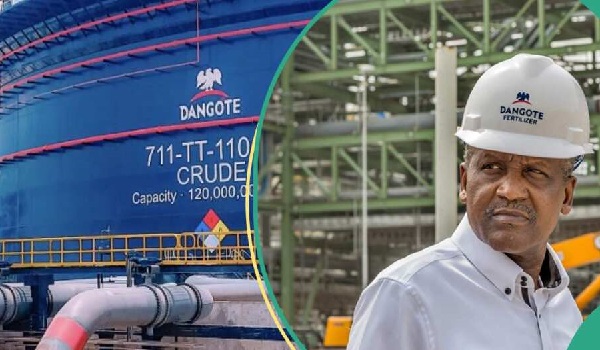The Central Bank of Nigeria (CBN) has projected that the commencement of refined petroleum production at the Dangote Refinery will drive down transportation costs, reduce inflation, and bolster the country’s foreign reserves.
CBN Governor Yemi Cardoso announced this during a press briefing following the 297th Monetary Policy Committee (MPC) meeting held at the CBN headquarters in Abuja on Tuesday. He emphasized that the refinery’s capacity to produce refined petroleum products locally will diminish the demand for foreign exchange, positively affecting Nigeria’s external reserves and overall balance of payments.

Cardoso expressed optimism that the operations at the Dangote Refinery will not only moderate transportation costs but also alleviate food price pressures in the short to medium term. “This development is expected to reduce foreign exchange demand for the importation of refined petroleum products, creating a favorable impact on our external reserves and improving our overall balance of payments,” he stated.
He further noted a positive outlook for Nigeria’s external reserves, which stood at $39.07 billion as of September 19, 2024—a 17.4% increase from $33.28 billion recorded in the same period last year. This level of reserves provides eight months of import cover for goods and services and 13 months for goods alone.
With ongoing operations at the Dangote Refinery, the CBN anticipates that external reserves will continue to strengthen in the coming months, contributing to sustainable foreign exchange management and enhancing economic stability.
What You Should Know
The Dangote Refinery, which began producing Premium Motor Spirit (PMS) in August, has successfully delivered its first consignment of petrol to the Nigerian market. As Nigeria’s first large-scale refinery, it marks a significant shift from decades of reliance on imported fuel, poised to meet domestic demand and potentially supply fuel for export to neighboring countries.
In its initial phase, the Nigerian National Petroleum Corporation (NNPC) Limited will act as the primary buyer, distributing the refinery’s fuel output nationwide. Aliko Dangote has stated that the refinery aims to eliminate Nigeria’s dependence on imported fuel in the coming months.
Reports indicate that the Federal Government plans to supply 12 million barrels of crude oil to the Dangote Refinery in October as part of a crude supply agreement under the Crude Oil for Naira deal between the government and the Dangote Group. This supply will enable the refinery to process crude into petrol, diesel, and jet fuel for the Nigerian market.
Additionally, Dangote mentioned that the crude oil supply would help reopen 50-60% of non-operational filling stations in the country, improving fuel availability. He also highlighted that the refinery’s operations would significantly reduce the need for extensive fuel shipping, thus lowering distribution costs.
Devakumar Edwin, Vice President of Oil & Gas at Dangote Industries, recently announced that 75% of the refinery’s local petroleum supply will be transported via sea routes, focusing on key locations such as Warri, Port Harcourt, and Calabar. Although the refinery can transport up to 83% of its products by road, this shift to sea transportation aims to mitigate the higher costs associated with road logistics.



